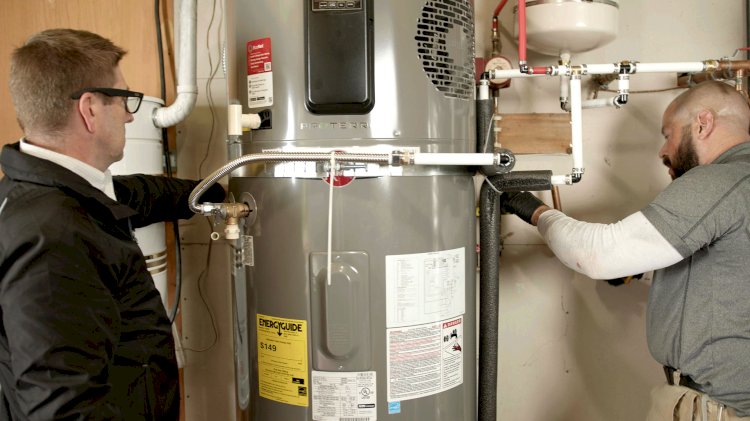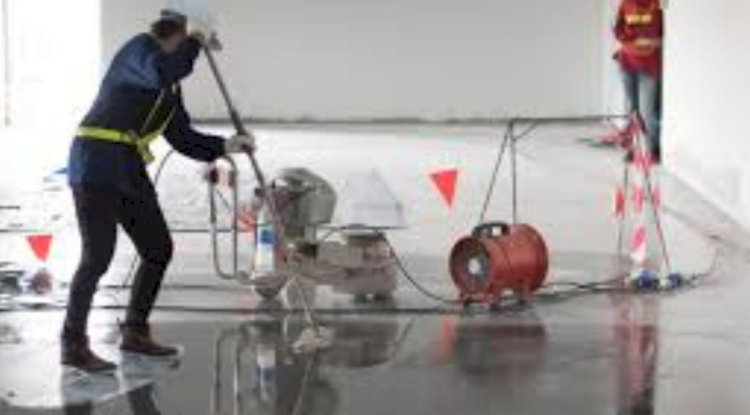5 Signs That Your Hot Water System Needs a Replacement
Are you experiencing less-than-pleasant surprises when you step into the shower, only to find that the water isn't as hot as it used to be?

Are you experiencing less-than-pleasant surprises when you step into the shower, only to find that the water isn't as hot as it used to be? If so, it could be a sign that your hot water system needs repair or a replacement. Recognizing the signs of a failing water heater can help you avoid sudden cold showers and potential water damage.
In this article, we will explore five clear indicators that your hot water system is on its last leg. From odd noises and leaks to rusty or discolored water, these warning signs should not be ignored. We'll also discuss the importance of regular maintenance and how it can extend the lifespan of your hot water system.
Don't wait until your water heater completely stops working before taking action. By identifying the signs of a failing hot water system and arranging for a replacement in a timely manner, you can ensure that you and your family can enjoy hot showers and a reliable water supply. Stay tuned to learn how to spot the signs and take action to stay comfortable in your home.
Importance of a functioning hot water system
Having a functioning hot water system is essential for modern-day living. From hot showers to washing dishes and doing laundry, we rely on hot water for numerous daily activities. Imagine waking up to a freezing cold shower or not being able to wash your clothes properly due to insufficient hot water. A properly functioning hot water system is not just a luxury but a necessity for maintaining a comfortable and hygienic living environment.
Signs of a failing hot water system
Decreased water temperature
One of the first signs that your hot water system may need a replacement is a noticeable decrease in water temperature. If you find that the water is not as hot as it used to be, even when the temperature setting remains the same, it could indicate a problem with your water heater. This decrease in temperature could be due to a variety of issues, including a failing heating element, sediment buildup, or a malfunctioning thermostat.
Leaks or pooling water around the hot water system
If you notice any leaks or pooling water around your hot water system, it is a definite cause for concern. Leaks can occur due to corrosion, rust, or damage to the tank or pipes. Ignoring these leaks can lead to further damage, including water damage to your property and even potential mold growth. It is important to address any leaks promptly to prevent further complications and to ensure the safety of your home.
Strange noises or unusual smells
Unusual noises coming from your hot water system, such as popping, rumbling, or banging sounds, are indications that something is not right. These noises can be caused by sediment buildup or a malfunctioning heating element. Additionally, if you notice any unusual smells, such as a sulfur-like odor, it could indicate a problem with your water heater. Strange smells can be a sign of bacteria growth in the tank, which can affect the quality of your hot water and potentially pose health risks.
Age of the hot water system
Another sign that your hot water system may need a replacement is its age. On average, a water heater has a lifespan of about 8 to 12 years. If your system is approaching or exceeding this age range, it is more likely to experience issues and require frequent repairs. Older water heaters are also less energy-efficient, resulting in higher energy bills. Therefore, if your hot water system is reaching its golden years, it may be time to consider a replacement.
Decreased water temperature
While it is always recommended to seek professional assistance for hot water system issues, there are a few troubleshooting steps you can take before calling a plumber. Firstly, check the circuit breaker to ensure that it hasn't tripped. If the breaker is fine, check the pilot light if you have a gas water heater. Relighting the pilot light may solve the problem. If you have an electric water heater, check if the heating element needs to be replaced. However, it is important to exercise caution when attempting any DIY repairs and to consult a professional if you are unsure or if the issue persists.
Leaks or pooling water around the hot water system
Replacing your hot water system can bring about a range of benefits. Firstly, a new water heater will provide you with consistent hot water, ensuring that you and your family can enjoy comfortable showers and have access to hot water whenever needed. A new system also offers improved energy efficiency, which can lead to lower energy bills and reduced environmental impact. Additionally, modern hot water systems often come with advanced features such as programmable settings and improved safety measures, providing a more convenient and secure experience.
Strange noises or unusual smells
When selecting a new hot water system, there are several factors to consider. Firstly, determine the appropriate size for your household's needs. A system that is too small may not provide enough hot water, while one that is too large can lead to unnecessary energy consumption. Additionally, consider the energy source for your water heater, such as gas, electricity, or solar power, and choose the most suitable option based on availability and cost-effectiveness. Other important factors to consider include the system's efficiency rating, warranty, and installation requirements.
Age of the hot water system
A failing hot water system can be a major inconvenience and disrupt your daily routine. By recognizing the signs of a failing water heater and taking action promptly, you can avoid unexpected cold showers and potential water damage. Regular maintenance and timely replacements are essential for ensuring a reliable supply of hot water in your home. If you are experiencing decreased water temperature, leaks, strange noises, or if your hot water system is reaching its lifespan, it may be time to consider a replacement. Choose a new system that meets your household's needs and enjoy the benefits of consistent hot water and improved energy efficiency. Don't wait until it's too late - take action now for a comfortable and hassle-free hot water experience.
DIY troubleshooting for hot water system issues
One of the first signs that your hot water system may need a replacement is its age. Most water heaters have a lifespan of around 8 to 12 years, depending on the make, model, and maintenance. If your hot water system is nearing or has exceeded this age range, it's time to start considering a replacement.
As water heaters age, their efficiency decreases, resulting in less hot water and longer heating times. Additionally, older systems are more prone to leaks and other issues that can cause damage to your home. If you're unsure about the age of your hot water system, you can typically find the manufacturing date on the serial number sticker, which is often located on the side of the tank.
Replacing an old water heater with a new, energy-efficient model not only ensures a reliable hot water supply but can also save you money on your energy bills. Newer models are designed to be more efficient, using less energy to heat the water, which can result in substantial savings over time. So, if your hot water system is reaching the end of its expected lifespan, it's wise to start exploring replacement options.
Benefits of replacing a hot water system
While some hot water system problems require the expertise of a professional plumber, there are a few troubleshooting steps you can take before calling for help. It's essential to note that safety should always be your top priority, and if you're uncomfortable or unsure about any of these steps, it's best to consult a professional.
One common issue that can affect the performance of your hot water system is a buildup of sediment in the tank. Over time, minerals and other debris can settle at the bottom of the tank, causing reduced efficiency and potentially damaging the heating elements. To address this, you can try flushing the tank to remove the sediment.
To flush the tank, start by turning off the power supply to the water heater. Next, locate the drain valve at the bottom of the tank and attach a hose to it. Place the other end of the hose in a drain or outside area where the water can safely flow. Open the drain valve and allow the water to flush out for a few minutes until it runs clear. Finally, close the drain valve and turn the power supply back on.
While flushing the tank can help improve the performance of your hot water system, it's important to note that it may not solve all issues, especially if the system is old or experiencing other problems. If you continue to experience issues or notice any of the other signs mentioned in this article, it's best to consult a professional plumber for a thorough assessment.
Choosing a new hot water system - factors to consider
When it comes to replacing a hot water system, you may be hesitant due to the cost and inconvenience. However, there are several benefits to consider that make it a worthwhile investment.
Firstly, a new hot water system can provide improved energy efficiency, resulting in lower energy bills. As mentioned earlier, older systems become less efficient over time, leading to higher energy consumption. By upgrading to a newer model, you can take advantage of the latest technology and enjoy significant savings on your monthly bills.
Secondly, a replacement can offer improved reliability and performance. Older systems are more prone to breakdowns, leaks, and other issues that can disrupt your daily routine. By installing a new and reliable hot water system, you can have peace of mind knowing that you won't have to deal with unexpected cold showers or potential water damage.
Furthermore, newer models often come with advanced features that can enhance your overall hot water experience. For example, some systems offer adjustable temperature controls, allowing you to set the water temperature to your desired level. Others may have faster heating times, ensuring that you have hot water available whenever you need it.
Lastly, replacing your hot water system can increase the value of your home. Potential buyers are often interested in properties with updated and efficient systems, as it can save them money on utility bills in the long run. So, if you're considering selling your home in the future, a new hot water system can be an attractive selling point.
When weighing the benefits of replacing your hot water system, it's important to consider the long-term savings, improved reliability, enhanced features, and potential increase in property value. While the upfront cost may seem significant, the return on investment and overall comfort and convenience make it a worthwhile expense.
Conclusion
If you've decided that it's time to replace or repair your hot water system, there are several factors to consider when choosing a new one. To ensure you make the right decision for your needs and budget, here are some essential factors to keep in mind:
1. Fuel Type: Hot water systems can be powered by electricity, gas, or solar energy. Each fuel type has its pros and cons, so it's important to consider factors such as availability, cost, and energy efficiency.
2. Storage Type: Hot water systems are available in both storage and instantaneous models. Storage systems store hot water in a tank, while instantaneous systems heat water on-demand. The choice between the two depends on your hot water usage and space availability.
3. Capacity: Consider the size and water capacity of the hot water system. The capacity should be sufficient to meet your household's hot water demands without running out or causing a significant delay in heating times.
4. Energy Efficiency: Look for hot water systems with a high energy efficiency rating. This can help you save money on energy bills and reduce your environmental impact.
5. Installation and Maintenance: Consider the installation requirements and ongoing maintenance needs of the hot water system. Some systems may require additional space or specific plumbing connections, while others may have higher maintenance requirements.
By carefully considering these factors, you'll be able to choose a hot water system that meets your specific needs and provides reliable hot water for years to come.
Share
What's Your Reaction?
 Like
2
Like
2
 Dislike
0
Dislike
0
 Love
1
Love
1
 Funny
0
Funny
0
 Angry
1
Angry
1
 Sad
0
Sad
0
 Wow
0
Wow
0


















1
1